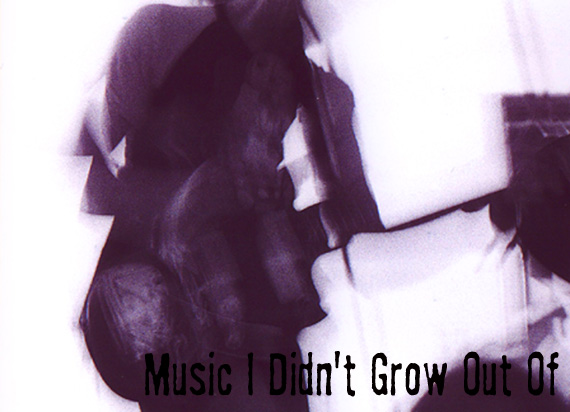Here's a surprisingly tame video (from taisou.vox.com) of truly frightening Japanese hardcore legends G.I.S.M. performing "Death Exclamations," one of their better known numbers:
The first few times I heard G.I.S.M., the instrumentation and arrangement seemed far too metallic and the growled vocals didn't interest me. Stories about G.I.S.M.'s lead singer Sakevi and his comportment during their live performances, however, morbidly piqued my interest. Through various sources I heard that Sakevi was known for not just attacking audiences with fists and mic stands, but apparently graduating to brandishing flares, tear gas, chainsaws, and flamethrowers and chasing crowds with them. I assume he never actually hacked up or set anyone on fire (during a show, at least), but he was also purportedly responsible for piping nauseating gas into clubs where G.I.S.M. was playing, and for mass-poisoning audiences by spiking drinks with some mild toxin. Sakevi explained his motivation this way: "Our mission is to recall the mental tension of the people [...] and it would show as a guerilla band shooting out persistantly the fighting spirit against the collapsing world."
Hearing these rumours years after having heard and dismissed G.I.S.M., I became fascinated with the idea that an apparent sociopath would feel it necessary to form a band to "express" his opinions and feelings. How would someone given to these sorts of behaviours translate his feelings into song? That someone of Sakevi's inclination even had the patience to assemble a band and practice to perfect the art of making music to match his feelings about "the collapsing world" was intriguing on its own. Thus, I tracked down and listened to a copy of Detestation, the band's first full-length album.
While I still don't have much taste for metal or for heavily metallic music, I have developed some sort of feeling for Detestation. I don't really like it, but I respect (or, at least, am frightened by) it. In light of details about Sakevi's performances, as well as his institutionalizations and episodes of random offstage violence, the music becomes a lot more ominous. Elements that seemed absurd on first listen now seem unsettling (the same way behaviour that seems "funny" in an otherwise sensible individual becomes a red warning flag in a person with a history of psychosis), and the music itself seems to personify the mental state of the voice apparently leading it. The lyrics and song titles are in fractured, muddled English, which amplifies the feeling (in an English-speaking listener) of disconnection and breakdown. Sakevi's voice delivers with certainty frightening statements which make only partial sense, whose grey areas exacerbate the sinister implication behind them. That voice, incidentally, creeps from a standard Japanese-hardcore growl to delusional-operatic puppet vocals (for example toward the end of "Nih Nightmare") that are a good deal weirder than just growling.
But the growling is weird enough, especially when it's fanatically celebrating "Death, Agony and Screams" (pronounced "dess-uh, aguhr ee-uh scREEz!"), and the guitar-noodling that follows is likewise uneasy-- dizzy and barely in tune, it doesn't sound any more healthy than the vocals. Taken as a whole, the package of the record sounds truly evil. Unlike so many hardcore acts obsessed with toughness and violence and fighting, there's no test of strength inherent in G.I.S.M. Instead, this is music that sounds unwell, as though it lacks the strength to restrain its desire to poison your water supply or set your house on fire while you're asleep.
The video above seems filmed well after the band's mid-80s heyday, and is just the band performing the song with no apparent threat to the audience. However, I watch it with the same fascination as that with which I listen to the records, marvelling at the people responsible for this captivating and horrifying music.
Monday, March 10, 2008
Subscribe to:
Post Comments (Atom)



No comments:
Post a Comment